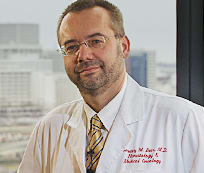Dr. Tomasz M. Beer

About Dr. Tomasz M. Beer
“I think those of us who do prostate cancer research and take care of patients are reminded every time we are in clinic that what we do today is better than what we did before,” says Dr. Tomasz Beer, deputy director of the Knight Cancer Institute at Oregon Health and Science University. “But it’s still not good enough.”
Dr. Beer has focused his career on finding treatments—and someday a cure—for prostate cancer. With funding and support from PCF, his progress has moved much faster than it would have otherwise. Specifically, he credits PCF’s support of the Prostate Cancer Clinical Trials Consortium (PCCTC), a collaboration of 13 institutions across the country working together, to get patients into clinical trials faster. The PCCTC is jointly funded by PCF and the U.S. Department of Defense’s Congressionally Directed Medical Research Programs.

“I think it would be fair to say we used to work in silos largely on our own, with a few collaborations nationwide,” says Dr. Beer. “Now we’re really a team working hand-in-hand. And we’ve seen clinical research increase by a factor of three or four in terms of how quickly early stage studies get done. It’s really been a transformative experience for us.”
The PCCTC has generated noticeable benefits for prostate cancer patients. For example, the prostate cancer drug MDV 3100 moved from initial clinical trials to a Phase III study—the final step before FDA approval—within just two years. “I think that’s faster than any drug in the history of cancer research, and that was made possible by collaboration,” says Dr. Beer.
He also credits recent successes to PCF’s leadership in funding cutting-edge research with the potential for groundbreaking returns—and engaging the entire prostate cancer community in the process.
“To be good, research has to be highly innovative, and PCF is focused on fostering the most innovative ideas in the field,” says Dr. Beer. “PCF has been able to transcend institutions and work across the spectrum of diverse stakeholders, to bring them together around the common vision of progress against prostate cancer.”









